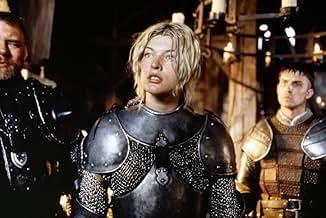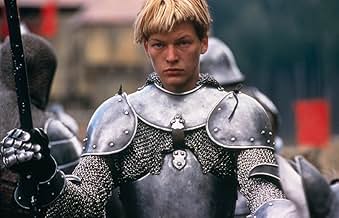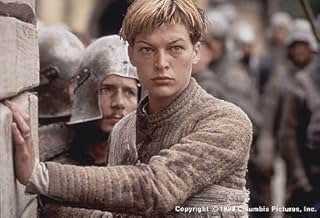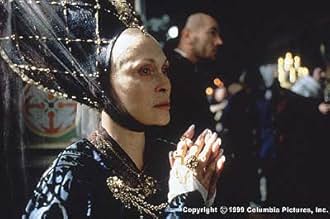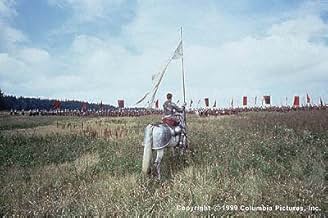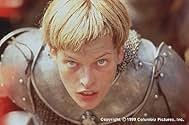A young girl receives a vision that drives her to rid France of its oppressors.A young girl receives a vision that drives her to rid France of its oppressors.A young girl receives a vision that drives her to rid France of its oppressors.
- Awards
- 5 wins & 13 nominations
- Look Out
- (as Stephane Algoud)
- Director
- Writers
- All cast & crew
- Production, box office & more at IMDbPro
Storyline
Did you know
- TriviaMost of the characters in the film, including Joan's Captains, were real historical people. Giles de Rais (Vincent Cassel) was a real person who, after the war, and Joan's death, retired to his lands. Many years later, he was arrested for the murder of more than one hundred young boys and was executed. Some historians believe that his crimes became the basis for the French fairy tale "Bluebeard", about a rich man who murders his wives and hides their bodies in his grand house.
- GoofsJoan's older sister was not murdered by soldiers, but survived to adulthood and married. She died ultimately in childbirth.
- Quotes
Joan of Arc: I've always been faithful to God and I've followed everything He's ever said and I've done everything He's ever asked me to do.
The Conscience: God asked you to do something?
Joan of Arc: Yes. Yes, lots of things.
The Conscience: You mean God said, "I need you, Jeanne."
Joan of Arc: No. But He sent me signs.
The Conscience: Signs? What signs?
Joan of Arc: The wind. The wind. And the clouds, ringing!
The Conscience: Ringing clouds?
Joan of Arc: The dance. The dance. The dance. The dance.
The Conscience: The dance.
Joan of Arc: The sword! The sword lying in the field. That was a sign.
The Conscience: No. That was a sword in a field.
Joan of Arc: No. No, that was a sign!
The Conscience: No. That was a sword. In a field.
Joan of Arc: It can't just get there by itself! It can't. A sword just doesn't get there by itself. It can't just get there by itself.
The Conscience: True. Every event has an infinite number of causes, so why pick one rather than another? There are many ways a sword might find itself in a field.
- Alternate versionsThe European release was 10 minutes longer than the US theatrical version, which omits, among others, the scene where Joan's virginity is tested before the court of King Charles VII. The longer version has been released in the USA on DVD.
- SoundtracksMy Heart Calling
Lyrics and Music by Éric Serra and Achinoam Nini
Produced by Éric Serra
Performed by Achinoam Nini
With the Special Authorization of Interscope/Geffen
The picture that Luc Besson made here deserves to be appreciated on its own merits. It is visually stunning, rousingly action-packed, and full of interesting period details. Yes, casting his supermodel wife Milla Jovovich in the lead was a risky choice, as her looks were hardly those of a typical medieval peasant. Yes, her performance did not resonate with the period the way one by a more classically trained actress might, although she was clearly never trying to be Ingrid Bergman. Still, Milla's hyperactive personality made her interesting and watchable as a historical person about whom so much has been written, who nonetheless existed so far back in the past that she lacks a strongly identifiable humanity. When somebody makes a better statue than a person, as Joan does from a contemporary viewpoint, odd casting choices can be forgiven if they work. Milla's twisty mannerisms, rolling eyes and whispery speech give the viewer constant occasions to ponder just how much of Joan's fanaticism came from genuine devotion to God and the church and how much was just an under-medicated personality disorder. This is actually one of the key scholarly issues surrounding Joan's life, and the picture brings it to the fore in its latter part as Joan herself tries to come to terms with her own claims of divine communication by means of a debate with Dustin Hoffman as her confessor-priest/conscience. That Besson takes no particular viewpoint here is an interesting choice, and one which actually helps the viewer to understand why Joan's story has compelled so many generations of historians.
The political aspects of Joan's life and legend were also dealt with in a nicely balanced fashion. Like many figures in times when political and national alliances changed with the seasons, Joan herself blew back and forth between being tremendously useful to the French throne at times and dangerously inconvenient at others. Fame is a powerful commodity at any time, and the picture carefully tracked the rise and fall of Joan's fortunes as she watched hers be manipulated, leveraged and ultimately put on trial.
I thought a lot of The Messenger and recommend it. Religious and historical scholars are advised to approach with caution.
- How long is The Messenger: The Story of Joan of Arc?Powered by Alexa
Details
- Release date
- Countries of origin
- Languages
- Also known as
- The Messenger: The Story of Joan of Arc
- Filming locations
- Bruntal, Czech Republic(Fort of the Tourelles)
- Production companies
- See more company credits at IMDbPro
Box office
- Budget
- $85,000,000 (estimated)
- Gross US & Canada
- $14,276,317
- Opening weekend US & Canada
- $6,360,968
- Nov 14, 1999
- Gross worldwide
- $66,976,317
- Runtime2 hours 38 minutes
- Color
- Sound mix
- Aspect ratio
- 2.39 : 1
Contribute to this page




